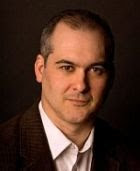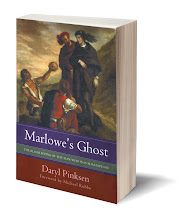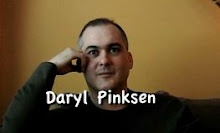.
Hello Robin,
I read your critique of my Writer's Digest excerpt with great interest. I think I owe you some answers.
"Between 1585 and 1593, Christopher Marlowe transformed the face of English drama." Does Mr. Pinksen believe that Marlowe transformed the face of English drama all by himself? Thomas Kyd, John Lyly and Robert Greene were all writing plays between 1585 and 1593. They too help to transform the face of English drama. Marlowe, Kyd, Lyly and Greene laid the foundations. Yes, Christopher Marlowe was the best playwright in the group.
By way of analogy, I could also say that, "Einstein transformed the face of modern physics." Hyperbole? Well, there were plenty of other physicists who contributed to the development of modern physics; Heisenberg, Bohr, Schroedinger, and other illustrious scientists were all making great strides in the first decades of the 20th century. They too helped transform modern physics. I would argue that Marlowe's dominance of his group was as great, or perhaps greater, than Einstein's dominance of his group. Would physicists take issue with my statement about Einstein? Some might, but let's be honest, how would their protestations sound? My statement is not hyperbole, it is informed opinion.
Mr. Pinksen appears to use the term Shakespearean drama in a general sense. Perhaps, he uses it to confuse his readers? Most scholars in the fields of theatre and drama use the term Shakespearean drama to refer to only the plays of William Shakespeare. There are similar terms when referring to specific playwrights of the period. When referring to all the plays of the period, they use Elizabethan, Jacobean, or Caroline drama.
I am not using the term generally. I use the term, as you do, for the Shakespeare plays. Where we differ is that I argue that the Marlowe plays, and the Marlowe plays alone, are a part of that tradition. Marlowe, it can be argued, without hyperbole, created the style of drama which we now know as "Shakespearean." I'm essentially paraphrasing Harold Bloom, among others: "Yet Marlowe, himself a wild original, was Shakespeare’s starting point, curiously difficult for the young Shakespeare to exorcise completely.… And yet that means the strongest writer known to us served a seven-year apprenticeship to Christopher Marlowe." Bloom’s Major Dramatists: Christopher Marlowe. 2002. p.10
Pinksen wonders, "Why are Marlowe’s revolutionary accomplishments largely unknown? " Really? They are known to scholars in the field of theatre and drama. I will grant you they are unknown to the general public.
In 2002 Michael Rubbo toured the streets of Canterbury (Marlowe's hometown, for the uninitiated), and asked people if they knew who Christopher Marlowe was. Most of them did not. To use another physics analogy, if I were to say, "Why are Nikola Tesla's revolutionary accomplishments unknown?" many physicists might object, saying that they know who he is and what he did. But this book, and my hypothetical book about Tesla, was not written to cater to a small number of scholars, it was written for the intelligent general reader. The statement is not hyperbole, it is accurate.
"Because Marlowe’s name has been reviled for four hundred years, his reputation in ruins." Come now, Mr. Pinksen! Who has reviled his name for four hundred years? His plays were published during his lifetime and after. His plays were performed during his lifetime and after. His plays are still performed today. Yes, Doctor Faustus is probably the most performed. On the other hand, from time to time, there are productions of Tamburlaine, Edward II, and even The Jew of Malta.
See my Chapter titled "Vile Esteem" for a litany of denunciations of Christopher Marlowe from 1593 onward. In 1891, a memorial plaque was erected to Marlowe in Canterbury. The original idea had been to place a memorial for him in Poet's Corner of Westminster Abbey (as he richly deserved), but this was ruled out because of opposition rising from those concerned about “Marlowe’s acknowledged life and expressions.” Marlowe's image has been somewhat rehabilitated in the last few decades, but a few token performances of Doctor Faustus does not make up for the trashing his name took after 1593. For the last several centuries Marlowe has been routinely described as a homosexual, pedophilic, blaspheming, treasonous, heretical atheist. In the last few decades, the public has been willing to ignore most of these charges, but this does not erase the past.
Yes, it is unfair to judge a book by a brief excerpt. On the other hand, if Mr. Pinksen is wrong about some basic issue, one is left to wonder about the rest of the book?
Perhaps, instead of assuming I am wrong on these basic issues, you should read the arguments I make to defend them first before rendering judgment? In the two years since I published Marlowe's Ghost, flaws have been pointed out to me, places where I should have qualified statements, removed words, changed wording, etc., if I had it to do over. The book is not perfect, as you will discover should you take the time to read it, but it is very strong. I would be very happy to face your criticisms, and answer any questions, if you decide to read on.
Again, thanks for taking the time to read and comment,
Sincerely,
Daryl Pinksen





